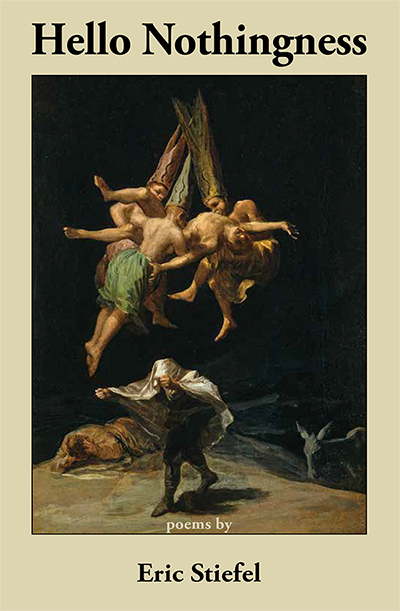 The unsayable inevitably finds its way into Smog Mother, not just in fantastic dreams, but in the ugliness of life and death, in the rushing precipices we face and try not to. Barger takes the role of poet to the letter when he lets disaster unfold in his work. You can feel that he barely blinks in the face of this darkness, not because he is unfeeling, but to take it all in.
The unsayable inevitably finds its way into Smog Mother, not just in fantastic dreams, but in the ugliness of life and death, in the rushing precipices we face and try not to. Barger takes the role of poet to the letter when he lets disaster unfold in his work. You can feel that he barely blinks in the face of this darkness, not because he is unfeeling, but to take it all in.
Category: Poetry Reviews
A review of Oh My Rapture by Gemma White
 Hidden amongst all the coarseness and slang words there is gentleness and poignancy, as you read page by page you can feel it. There is a voice impregnated in the words of the poems that are like two forces, forces that propel and repel each other.
Hidden amongst all the coarseness and slang words there is gentleness and poignancy, as you read page by page you can feel it. There is a voice impregnated in the words of the poems that are like two forces, forces that propel and repel each other.
A review of Dug-Up Gun Museum by Matt Donovan
 Donovan’s poems, sensitive and unflinchingly brave, pull us through this grisly reality, showing our country’s stubborn and sick fascination with guns, and downright reverence. We are expected to bury our human dead, and accept that guns will be dug-up. Not as relics, but as emblems of American freedom. New guns will be manufactured and purchased every day. Made to do what guns do.
Donovan’s poems, sensitive and unflinchingly brave, pull us through this grisly reality, showing our country’s stubborn and sick fascination with guns, and downright reverence. We are expected to bury our human dead, and accept that guns will be dug-up. Not as relics, but as emblems of American freedom. New guns will be manufactured and purchased every day. Made to do what guns do.
A review of I Have Decided to Remain Vertical by Gayelene Carbis
 An old literature professor I once had used to say, regarding the writing of poetry, “Don’t use the I”, “Don’t talk about feelings”, “Don’t be personal”, “Don’t use dialogue in poetry”. In I Have Decided to Remain Vertical Carbis breaks every rule, and the result is magnificent.
An old literature professor I once had used to say, regarding the writing of poetry, “Don’t use the I”, “Don’t talk about feelings”, “Don’t be personal”, “Don’t use dialogue in poetry”. In I Have Decided to Remain Vertical Carbis breaks every rule, and the result is magnificent.
A review of Magician Among the Spirits by Charles Rammelkamp
 In any biography of a great and celebrated figure, we’re always carried along by the climb to the top of their field. And it’s the same here. We applaud as Houdini goes from triumph to triumph, accompanied by his darling wife Bess, and even more by his first great love, his Mama. Inevitably, the crash occurs, if not the fall from grace, then at least the consequences of advancing years.
In any biography of a great and celebrated figure, we’re always carried along by the climb to the top of their field. And it’s the same here. We applaud as Houdini goes from triumph to triumph, accompanied by his darling wife Bess, and even more by his first great love, his Mama. Inevitably, the crash occurs, if not the fall from grace, then at least the consequences of advancing years.
A review of Hello Nothingness by Eric Stiefel
 The contradictory images reflect themes throughout Stiefel’s verse, which oscillates between nihilism and contentment – or at least resignation and a sensual appreciation of the ephemera of the world. As he writes in the opening poem, “Lest”: “I devour everything I can, the mind defaced, a tattered gown, strawberry leaf, a statue, half-submerged.”
The contradictory images reflect themes throughout Stiefel’s verse, which oscillates between nihilism and contentment – or at least resignation and a sensual appreciation of the ephemera of the world. As he writes in the opening poem, “Lest”: “I devour everything I can, the mind defaced, a tattered gown, strawberry leaf, a statue, half-submerged.”
A review of thresholds by Philip Radmall
![]() This ability to make us, as readers, ‘opener and unfamiliar’ is one the poet exploits deftly, peeling away any preconceptions we may have until we, too, see and feel his world anew. In part, this is down to his style. A novelist as well as a poet, Radmall’s poetry has many prose-like traits, in particular a freedom from rhyme or metre, heavily enjambed lines, and the hovering arc of a narrative.
This ability to make us, as readers, ‘opener and unfamiliar’ is one the poet exploits deftly, peeling away any preconceptions we may have until we, too, see and feel his world anew. In part, this is down to his style. A novelist as well as a poet, Radmall’s poetry has many prose-like traits, in particular a freedom from rhyme or metre, heavily enjambed lines, and the hovering arc of a narrative.
A review of Tide Should Be Able to Rise Despite Its Moon by Jessica Bell
 A Tide Should be Able to Rise Despite Its Moon is Bell’s first book of poetry in over ten years, but regardless of where her extensive creative practice takes her, her work has always reflected a poetic sensibility, so it feels almost like this is her centrepoint.
A Tide Should be Able to Rise Despite Its Moon is Bell’s first book of poetry in over ten years, but regardless of where her extensive creative practice takes her, her work has always reflected a poetic sensibility, so it feels almost like this is her centrepoint.
A review of The Unintended Consequences of the Shattering by Linda Adair
 Adair is not afraid to bring up difficult issues such as the cruelty of online chats, sacrificed ecosystems and the greed and entitlement of First World multinationals. The poet is also very skilled in narration, and tells stories with a voice that is poetic beautiful and deliberate.
Adair is not afraid to bring up difficult issues such as the cruelty of online chats, sacrificed ecosystems and the greed and entitlement of First World multinationals. The poet is also very skilled in narration, and tells stories with a voice that is poetic beautiful and deliberate.
How Light Comes Up Off the Lake: a review of Old Snow, White Sun by Caroline Goodwin
 Not at all self conscious, these poems are quite deliberate, the made thing. Each has its note of authority, as in the first poem’s first image, “the common loon made a thumbprint on the lake.” Part elegy, part journal, part memoir, part love song, part accusation, part celebration, all in the voice a person with something to say, a poet with the ability to make a word—loon, cattails, meadow—all her own.
Not at all self conscious, these poems are quite deliberate, the made thing. Each has its note of authority, as in the first poem’s first image, “the common loon made a thumbprint on the lake.” Part elegy, part journal, part memoir, part love song, part accusation, part celebration, all in the voice a person with something to say, a poet with the ability to make a word—loon, cattails, meadow—all her own.